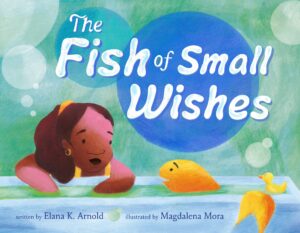by Patrick Coy-Bjork ‘24
 English majors are well-known for exploring a wide range of post-graduation paths beyond the world of literature. Even within the literary field, graduates can end up in a variety of unique careers. With that being said, we are delighted to feature alumnus Magdalena Mora, who graduated from Macalester in 2013 with a degree in English Literature. Currently based in Minneapolis, Magdalena has worked as a professional illustrator since 2019. She has now illustrated seven different children’s books with multiple different publishers. Her beautiful artwork has been celebrated by The New York Times, The Chicago Public Library, and The Pura Belpré Awards. Last month, I had the joy of interviewing Magdalena, who was kind enough to take the time to share her experience and perspective.
English majors are well-known for exploring a wide range of post-graduation paths beyond the world of literature. Even within the literary field, graduates can end up in a variety of unique careers. With that being said, we are delighted to feature alumnus Magdalena Mora, who graduated from Macalester in 2013 with a degree in English Literature. Currently based in Minneapolis, Magdalena has worked as a professional illustrator since 2019. She has now illustrated seven different children’s books with multiple different publishers. Her beautiful artwork has been celebrated by The New York Times, The Chicago Public Library, and The Pura Belpré Awards. Last month, I had the joy of interviewing Magdalena, who was kind enough to take the time to share her experience and perspective.
On the topic of Magdalena’s time at Macalester, she recounted that it took a while for her to decide on her major; she “tried out sociology for a bit, but kept gravitating towards English and taking English classes.” She said she has “always loved reading, writing, and drawing,” and that some of her favorite English courses were ones in which she could integrate the visual arts into her literature studies, such as a class focused on the analysis of graphic novels. As she puts it, she highly valued the chance to “study unconventional texts with the rigor and thoughtfulness they deserve. Being an English major at Mac opened [her] eyes to a whole range of different storytelling, and made [her] consider the value in all different types of stories.”
It may be a comfort for current English majors to hear that Magdalena considers her post-graduation career path to be “very windy.” Following graduation, she moved down to Austin, TX and began working for AmeriCorps in what she describes as a “jack-of-all-trades, marketing-adjacent role” in which she did work on social media and graphic design. She was also managing other jobs on the side: things like dog-walking and data entry. Reflecting on this period of time Magdalena said, “I think the publishing world felt too unattainable for me to even think about when I was 22 and 23. I didn’t even know where to start. I think especially if you didn’t go to school for art, it feels like an even bigger hill to climb to break into publishing as an illustrator.” So, for a while following her graduation, she “kind of took a break from drawing.”
A few years into living in Austin, she began working at an afterschool arts program which “worked with a bunch of different public schools in the area, and contracted out teaching artists like [herself].” She would write her own curriculum and lead three-to-four hour classes after school each week. This program was taught through the lens of social justice as well as Social and Emotional Learning (SEL). Around this time, Magdalena was getting back into her own artistic practice and discovering her love for illustration in children’s literature. She started structuring each of her classes around a picture book. As she says, this was “kind of like the best research” for her eventual career, as she got to “interact with kids, discuss the books, and see how they responded to them.”
She then decided “to put everything into breaking into publishing.” She was signed by an agent who saw her website and was able to get her first book deal shortly after. Magdalena noted that she felt helped by her English major as she began work as an illustrator. She explained, “You can learn the [artistic] skills, but it’s a little bit harder to learn the story-telling side of it: how to communicate a full story or portion of a story in a single image, so it helped to have that English background where you’re using a lot of the same skills. Even with children’s books, there’s a lot of deep reading involved. I didn’t go to art school, but I felt like I had this other background that gave me a better understanding of story, so it felt like I had skills that lent well to the career.”
Much of Magdalena’s work explores themes of activism and social justice. This was partly inspired by many of the books Magdalena discovered while working with the after-school program. In her words, “Children’s books are a lot of kids’ first introduction to empathy and learning about people. I think the types of books being published now are a little more explicit and thoughtful about that, and get storytellers who have the lived experiences to tell those stories. When I was growing up, there weren’t a lot of books about Latinos, and if there were, they weren’t told by Latinos, so I think publishing has gotten a lot better about that. I think I came into publishing at a time when there was a growing appreciation and understanding that these kinds of books would be something children would be interested in and would reflect children’s lived identities.”
Additionally, Magdalena shared, “A lot of my beginning portfolio pieces were drawing personal family stories. I would write down a memory or family story from childhood and illustrate that, and as a result, my initial portfolio reflected a lot of these stories about immigration and labor: stories that were really personal to me and my family.” She explained that publishers are often very thoughtful about looking at the themes presented in an illustrators’ portfolio and seeing if they’d be a match for stories that they might have. As a result, Magdalena was initially offered to illustrate for the kinds of stories she had already been thinking about and focusing her artistic practice on.
Some of Magdalena’s artwork:



With this, she also noted how this can somewhat result in an illustrator being pigeon-holed and becoming the go-to person to illustrate certain kinds of stories, such as books on the topics of activism or immigration. Magdalena feels very thankful that she has “had the opportunity to illustrate these sorts of stories,” but also expresses hope that publishers can “see the expansiveness of illustrators and authors” much greater than a single type of narrative or theme. “I think that’s kind of the place I’m in right now,” Magdalena said, “trying to tell different stories that will still be really meaningful and reflect the identities and experiences of a lot of kids, but in a different way.”
Magdalena also spoke on how “it can be really challenging to work on books about difficult subjects.” She recounted, “Last year, I worked on three books all about immigration, and submerging myself in research about family separation and deportation. It can be a heavy thing to be immersed in that. The work feels really meaningful, but there’s also kind of a need for levity or hope. All of the stories I’ve worked on have had hope. They haven’t sugar-coated the issues, but they have been hopeful.”
At the end of the interview, I asked Magdalena if she had any advice for current Macalester students. She shared two pieces of wisdom. The first was to “stay curious.” She said that this was something Mac students naturally do while in school, but with all of life’s responsibilities that come after graduation, she felt that it can be hard to prioritize the space to pursue interests and new ideas.
The second piece of advice was to think about the things that interested you as a child. As she puts it, “I sometimes think the child version of yourself is the truest version of yourself. I had always wanted to write and draw as a kid, and kind of lost that after college, so I think it helps to reflect on the things you loved in childhood when there was no pressure or anything attached to it. I think that can provide a lot of answers if you have a lot of questions.”
Magdalena has two books scheduled to release next year! The first is The Fish of Small Wishes, a contemporary fairytale retelling of a Jewish folk tale, authored by Elana K. Arnold. The second, Barrio Rising, is written by María Dolores Águila. This story recounts the powerful community activism which took place in San Diego’s Chicano Park in 1970.


Thank you so much to Magdalena for taking the time for this interview. You can see more of her beautiful work at her website: https://www.magdalenamora.com
*Some responses edited for clarity